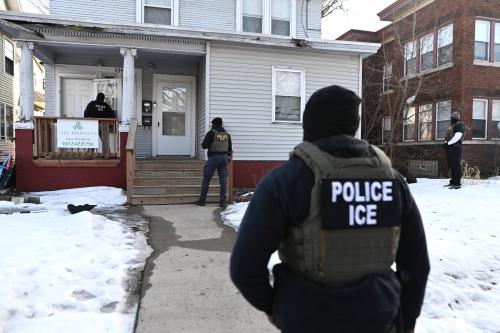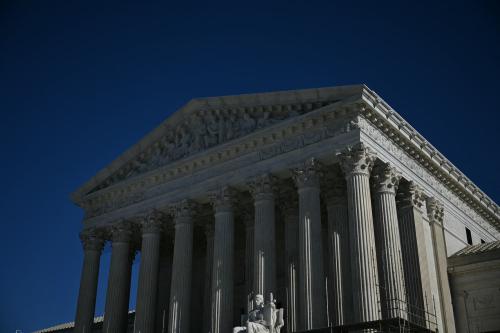Today, the Center for 21st Century Security and Intelligence at Brookings hosted a discussion on the upcoming elections in Afghanistan as well as the planned drawdown of foreign troops by the end of 2014. Participants included General John Allen (USMC, Ret.), former commander of NATO International Security Assistance Force (ISAF) and U.S. Forces in Afghanistan and a Brookings distinguished fellow; Ronald Neumann, U.S. ambassador to Afghanistan from 2005-07 and currently president of the American Academy of Diplomacy; and Najib Sharifi, senior analyst at Afghanistan Analysis and Awareness, a Kabul-based think tank. Brookings Senior Fellow Michael O’Hanlon, recently back from a trip to Afghanistan, moderated the discussion.
Ambassador Neumann explained the United States’ two goals: peaceful passage of power from Afghan President Hamid Karzai to his successor, and a good election that makes progress toward democracy. “I think it’s very important,” Amb. Neumann said,
to understand that we the United States have two goals, which are related and interlocking but separate. One is an acceptable passage of power to a new president with a broadly-recognized acceptability by Afghans. The second is a reasonably better election, more progress and democracy. …
Polls and conversations show that Afghans care about the transparency of the election, they are excited about this election despite all the violence. … I’m going to predict that the turnout is going to be heavy in this election notwithstanding the violence because I think Afghans want it, and the fact that they want it means that they have a potential to react if they are denied a fair election and if it is massively fraudulent.
But there will be a high level of tolerance for what you might call equal opportunity fraud which I expect will take place all over the country by all the candidates and their backers.
Amb. Neumann cautioned against “reacting to all the cries and yells of fraud and misbehavior which will immediately break out after the first vote” this weekend because, he said, this is to be expected. The higher priority, he said, is a reasonable transfer of power “without too much violence between contending parties” because then “you go forward with the state, you go forward with building, and you have a chance for more elections and for more progress and democracy.”
Ambassador Neumann also outlined the profiles of the three major candidates: Abdullah Abdullah; Ashraf Ghani; and Zalmai Rassoul. “There are no huge ideological differences or big programmatic differences” among the candidates, the ambassador said.
You’ve got three that look like they have a chance at being in the top two. You’ve got a couple behind them who are going to be important in making deals. You are going to have a lot of politics in this election, probably after the first round of the election as people pick sides.
Of the big three, Dr. Abdullah is seen largely as the northern, western, Tajik, Northern Alliance candidate. But it’s not completely true; he has some support in the east he has some support in the south. He has negatives as well because of being seen as the non-Pashtun, and … Pashtuns who are at least a plurality of Afghanistan … think they ought to rule.
Ashraf Ghani is very popular in the west, accomplished economist, accomplished administrator. Also with big negatives, which have not been much touched on in the western press discussion. His selection of General Dostum as vice presidential candidate has touched raw nerves in people who fought against him during the war, particularly the Pashtuns who regard him as particularly brutal. Ghani is known to have a fiery temper and Dostum has a pretty fiery temper and people worry about putting the two worst tempers in Afghanistan together in leadership. And some people consider Ashraf Ghani a communist who is surrounded by communists and this is a big issue in a country that was dominated by a communist government … So, while Ashraf has big positives—he’s touched off a lot of positive enthusiasm, particularly among younger people—he’s got some big negatives. Also seen as a Pashtun nationalist. …
Dr. Rassoul is a member of the former ruling families of the king’s generation. He is a Pashtun although he hardly speaks Pashtun. He was a supporter of the king and so he is in many ways the candidate of continuity or most clearly seen as the candidate of continuity. And that is … reassuring to Afghans who are really tired of being buffeted by massive social change. Rassoul is looked at by most as Karzai’s covert candidate. … On the other hand he is also seen by many as a weak personality, not quite tough enough to take on the problems of the country.
Amb. Neumann put Abdul Rasul Sayyaf in fourth position.
Dr. Sharifi reviewed the election landscape, including the integral role of outgoing President Karzai, the role of ethnicity in voting, leading vs. other candidates, and Afghans’ enthusiasm to vote. Karzai, he said, “will play an integral role in the success or failure of the elections. And he will also play an integral role in who will win the results of the elections if he puts his weight behind a particular candidate.”
“Ethnicity,” continued Dr. Sharifi, “plays a prominent role in politics particularly on issues related to elections.” He continued:
This election is not about a person. That’s because we do not have an outright favorite in this election. It’s mainly about the team. In Afghanistan, ethnicity plays a prominent role in politics particular on issues related to elections. So we have teams … and the teams have shaped up in a way that covers, to a large extent, the major ethnic groups. But because we have four major ethnic groups, every team cannot be complete because it will leave out at least one ethnic group. …
Continuing on the role of ethnicity, the votes of three big ethnic groups—Pashtuns, Tajiks and Hazars—will be divided because we have many candidates who represent the ethnic groups and are on different tickets.
Dr. Sharifi then discussed the results of a poll conducted by FEFA, Afghanistan’s largest election monitoring organization, in which 92 percent of Afghans support the elections, and 75 percent say they will take part in elections. Dr. Sharifi emphasized that those polled included an equal number of men and women. In previous elections, he said, the turnout was just below 30 percent. And this all despite increasing Taliban attacks to disrupt the process.
General Allen enumerated five major tasks that the current ISAF commander, General Joe Dunford, is now handling, nearly simultaneously:
- Maintaining the “very delicate advisory and support balance that the ISAF forces continue to have with … the Afghan National Security Forces” as they “continue to move to the front in terms of securing the local population [and] also in dealing with the Taliban.”
- The “retrograde enterprise,” which consists of closing down bases, moving excess materiel (armored vehicles, shipping containers, etc.), and sending home troops and their equipment. General Allen noted that when he took command of ISAF in 2011, there were about 800 facilities, and he closed 500 of them in his first year, and now we need “to get down to a basing platform of some 10-12 bases by the end of this calendar year.”
- The “transfer of tasks.” Gen. Allen explained that ISAF headquarters is taking on hundreds of different mission tasks every day, and so has to transfer these to other entities, including: NATO’s follow-on mission, “Operation Resolute Support”; higher headquarters such as Central Command; civilian agencies; and to the Afghans themselves.
- Providing support to the Afghans for election security.
- Receiving the force that will replace ISAF under Resolute Support, “supposing of course that the bilateral security agreement will be signed.”
General Allen emphasized that from the Afghan’s point of view, “this election is all about their future … This business of the election, and the outcome and the peaceful transition of power from President Karzai to whoever will follow him, is very, very important to the average Afghan.”
Michael O’Hanlon added some essential facts to understanding the security situation on the ground, including:
- More than 85 percent of total armed strength in Afghanistan is Afghan, not NATO, “as it should be,” he said;
- the NATO coalition is down to below 50,000 troops; it was about 150,000 when Gen. Allen took command;
- Last year, Afghan forces carried out 95 percent of all the operations, either leading them or carrying them out alone;
- in 2013, Afghan army and police forces suffered 4,700 fatalities.
O’Hanlon described this last statistic as both good news and bad news:
On the one hand that’s very bad news. It’s 4,700 individuals whose lives have been lost, all their families that have been affected. And it shows the Taliban is still strong. … That’s the bad news. The good news is they are still fighting, and they have taken those causalities and they’ve held together, and they’ve continued to be able to recruit and have continued to take the fight to the enemy.
Listen to complete audio from the event:
The Brookings Institution is committed to quality, independence, and impact.
We are supported by a diverse array of funders. In line with our values and policies, each Brookings publication represents the sole views of its author(s).




Commentary
Expert Views on Afghanistan’s Upcoming Election and Security Situation
March 31, 2014